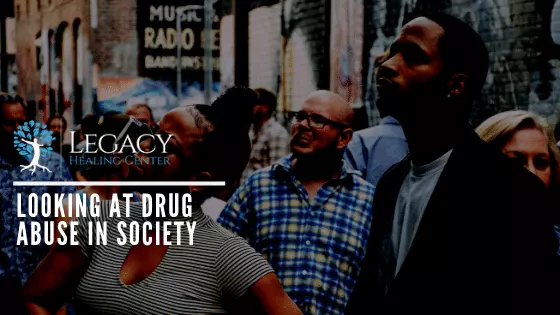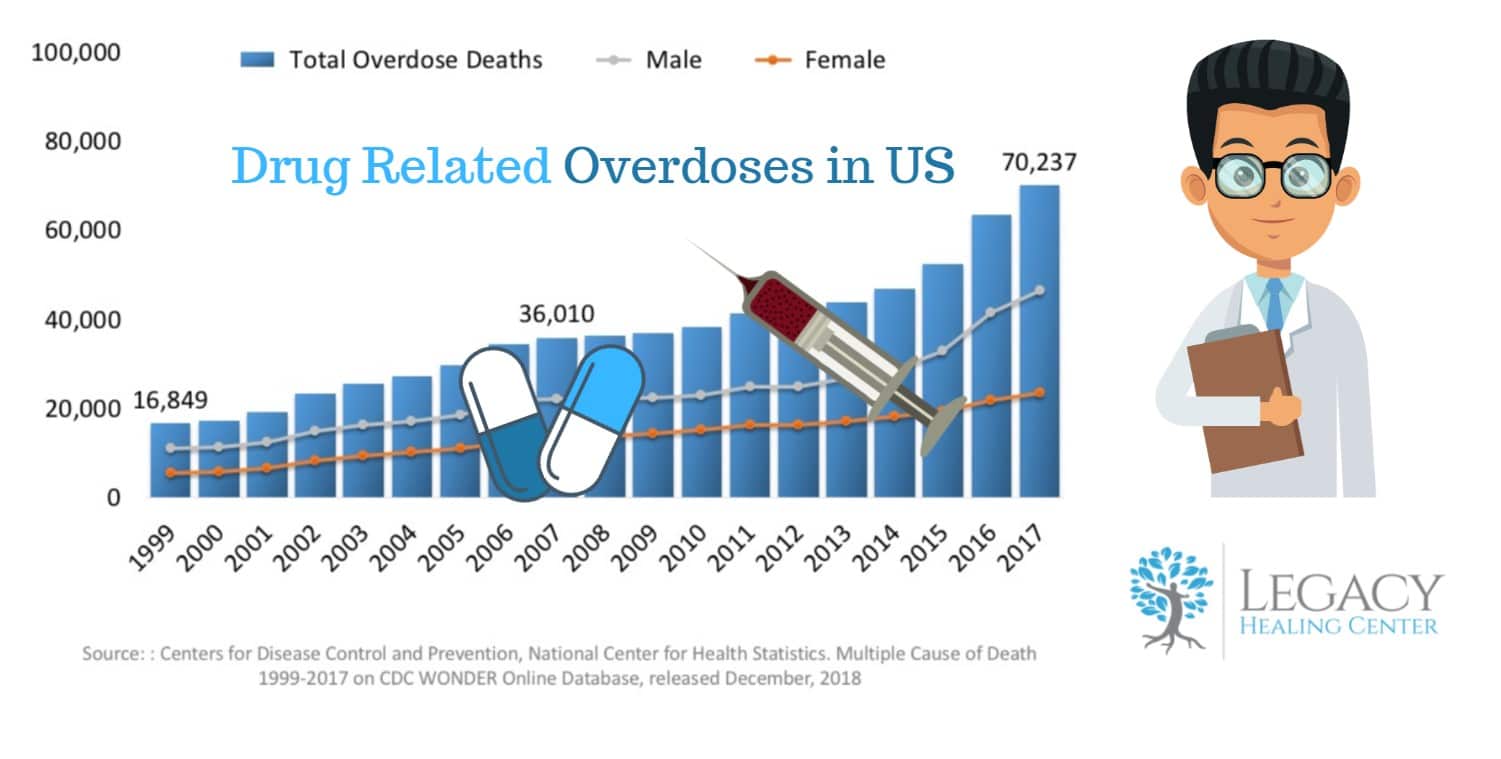
Looking At Drug Abuse in Society
Legacy Healing Center Blog
While prescription drugs abuse continues to take hold of millions of Americans each year, illicit drugs present serious threats towards communities and families nationwide. Drug use affects not only the user themselves, but it affects newborn children, families, neighborhoods, crime, and the economy.
As the opioid epidemic is raging through the U.S., illicit drug abuse of both opioids and amphetamines are devastating the lives of individuals, families, and the economy at shocking rates.
Opioid Abuse in Society
Each day, approximately 130 people die from an opioid-related overdose.1 This includes prescription opioids like oxycodone, codeine, and morphine, as well as illicit opioids such as heroin and fentanyl. While more than 47,000 people died as a result of an opioid overdose in 2017, the National Institute on Drug Abuse estimated that 1.7 million people were living with a substance use disorder involving prescription opioids and 652,000 suffered from heroin addiction.1

These statistics may be shocking, but what this means on a human level is even more devastating. This means that on any given day, an innocent baby is leaving the womb with a physical dependence on opioids, a mother is wondering if she will ever see her daughter alive again, a young widow is questioning if there was anything else she could have done to keep her husband alive, and our first responders are attending to one of the many overdose calls they will receive today – wondering whether or not Narcan will work this time.
Stimulant Abuse in Society
Stimulants, such as cocaine, methamphetamine, Adderall, and Ritalin, continue to be popular drugs of misuse despite the rampant opioid crisis. Much focus is placed on the opioid epidemic because it is responsible for the majority of overdose deaths, but in 2017, the number of deaths that occurred due to illicit stimulant drug abuse was 30% higher than the year prior.2
Some may believe that it is difficult or impossible to overdose on stimulants, but it isn’t that uncommon. In 2017, more than 7,600 people died from a stimulant related overdose.3 Stimulants can cause hypertension which can lead to heart or lung damage, stroke, heart disease, and brain disease. Unlike opioids, there is no overdose reversal medication in the case of a life-threatening situation involving amphetamines and other stimulants.
Effects of Drug Abuse on Crime
Illicit drug abuse causes a ripple effect in regards to how it affects society as a whole. The manufacturing, distribution, and use of illicit drugs is directly related to both crime and violence. Drugs not only influence drug-related crime, but they affect violent crime as well. Many people who are under the influence are suffering from the ability to make healthy decisions and think clearly, causing them to make irrational decisions and potentially act out in risky, dangerous behaviors.
17-18% of offenders report that committing their offense in order to obtain drugs or money for drugs to feed their addiction.3 These crimes range anywhere from money laundering to stolen property, to violent acts. The National Council on Alcoholism and Drug Dependence (NCADD) reports that 60% arrested individuals test positive for illicit drugs at the time of the arrest. In addition, they estimate that nearly 50% of jail and prison inmates suffer from addiction.3
Substance Abuse and Children of Addicts
Nearly a quarter of children are raised in homes where drugs or alcohol is abused. The NCADD has found that parents who suffer from substance abuse are three times more likely to abuse their children and four times more likely to neglect them. In addition, 75% of children in foster care are removed from their homes as a result of their parents abusing drugs. From this issue stems several more.3
Children who grow up in a home where their parents use drugs are 8 times more likely to abuse drugs themselves than children who do not. They are also at an increased risk of developing mental health issues and getting involved in crime than their peers who are raised in healthy homes. Addiction is a family disease, not only can it be passed down from one generation to the next, but it can have profound, life-long effects on children of addicts.
Drugs and the Economy
While substance abuse certainly affects the lives and wellbeing of families and communities across the nation, it also carries an expensive price tag on the U.S. economy. Costs that occur from substance abuse involve the incarceration of drug-related crime offenders, addiction treatment, ER costs, and paying law enforcement agents to devote special task forces solely for the purpose of drug-related operations. The economic cost of drug addiction is estimated to be more than $215 billion per year.1
Focusing on the Solution
Mitigating the terrible effects that drugs and substance abuse have on crime, families, and the economy starts by humanizing the disease of addiction and allowing addicts to have the chance to recover. Breaking the cycle of addiction is possible, and our addiction specialists at Legacy Healing Center are ready to help you start your journey to recovery today. We focus on the solution to help diminish the effects of drug abuse and addiction on society.
Sources:
- National Institute on Drug Abuse Opioid Overdose Crisis
- National Council on Alcoholism and Drug Dependence Alcohol, Drugs, and Crime
- National Institute on Drug Abuse for Teens Helping Children of Addicted Parents Find Help
- NCBI Familial Transmission of Substance Use Disorders
- The U.S. Department of Justice Impact of Drugs on Society
